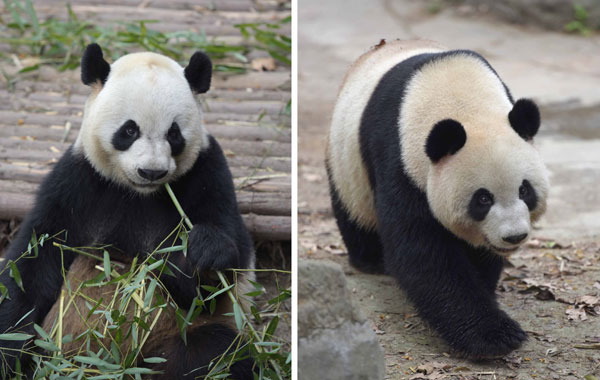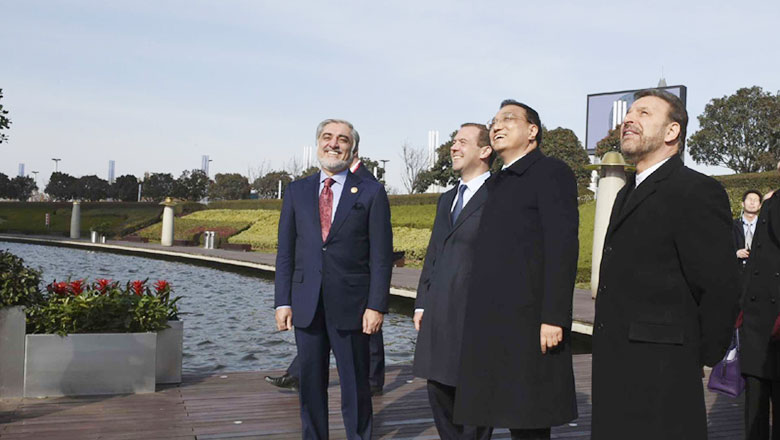Pandas prefer choosing their own sex partners, researchers find
Updated: 2015-12-17 07:14
(China Daily)
|
||||||||
 |
|
A pair of giant pandas gifted by the central government to the Macao Special Administrative Region arrived in Macao in April. [Photo/Xinhua] |
Worried about the low sex drive of giant pandas in zoos, scientists have tried many things to get them in the mood-including Viagra and "panda porn".
When all else failed, they've turned to artificial insemination to ensure the endangered black and white creatures have cubs.
On Tuesday, a study suggested the answer may be a lot simpler and, perhaps, more obvious: Let the pandas choose their own mates.
"Giant pandas paired with preferred partners have significantly higher copulation and birthrates," researchers said in the journal Nature Communications.
Generally, pandas in captivity are presented with a mate chosen by scientists based on the animals' genetic profiles. The goal is to minimize inbreeding and expand the DNA pool.
But the result is often frustrating, with the animals having to be coaxed through human intervention to show even the slightest sexual interest in whatever mate is paired with them.
A team from the United States and China ran a test at the China Conservation and Research Centre for the Giant Panda in Sichuan province to see if being allowed to choose their own partners might make a difference.
Male and female pandas were housed in enclosures with animals of the opposite sex on either side. They were allowed limited physical interaction with their neighbors through cage bars.
Scientists measured the animals' "mate preference behavior", which included different forms of playfulness and bond-forming, as well as sexual arousal.
Negative interactions could include signs of aggression or a mere lack of interest.
The animals were then introduced to each other for mating-with both preferred and non-preferred partners.
"The highest reproductive performance was seen when both males and females showed mutual preference," the researchers found.
The results should come as no big surprise. Ever since Charles Darwin published his theory of sexual selection in 1859, scientists have understood that mate selection is key to animal reproduction.
"Mate incompatibility can impede captive breeding programs by reducing reproductive rates," the study authors wrote. "It is therefore surprising that mate preferences have not figured more prominently in captive breeding programs."
"The future of conservation breeding will not take place in a test tube," they wrote.
Conservation group WWF estimates there are only about 1,600 pandas left in the wild in south-central China.
- Giant pandas brave the cold by settling in freezing north
- National parks for pandas planned in China
- Pandas spending their first winter in cold NE China
- Pandas delighted by 'snow day'
- New wireless eyes on pandas in the wild
- New eyes on pandas
- China's Sichuan establishes genetic profile for wild pandas
- China launches satellite to shed light on invisible dark matter
- China strongly opposes US arms sale to Taiwan
- Smog hits East China again
- China to adopt credit ratings for food, drug producers
- China to spend $93b relocating 10 million people
- Two Chinese Antarctic expedition teams set off for Antarctic inland
- Good international coordination a must to combat terrorism
- Chinese embassy: spy report 'sheer fiction'
- US, Cuba agree on restoring commercial flights
- Fed raises interest rates, first rate hike since 2006
- IAEA decides to close nuclear weapons probe of Iran
- Russia, US call for common ground over issues

 Canadian college offers flying classes to legless girl
Canadian college offers flying classes to legless girl
 Fashion buyer scours the world for trendy items
Fashion buyer scours the world for trendy items
 Tycoons exchange views on building a cyberspace community of shared future
Tycoons exchange views on building a cyberspace community of shared future
 Snow scenery of Taklimakan Desert in Xinjiang
Snow scenery of Taklimakan Desert in Xinjiang
 East China province gets 1st subway line
East China province gets 1st subway line
 President Xi delivers keynote speech at World Internet Conference
President Xi delivers keynote speech at World Internet Conference
 Chinese premier shows Zhengzhou's fast growth to SCO leaders
Chinese premier shows Zhengzhou's fast growth to SCO leaders
 Two Chinese Antarctic expedition teams set off for Antarctic inland
Two Chinese Antarctic expedition teams set off for Antarctic inland
Most Viewed
Editor's Picks

|

|

|

|

|

|
Today's Top News
Shooting rampage at US social services agency leaves 14 dead
Chinese bargain hunters are changing the retail game
Chinese president arrives in Turkey for G20 summit
Islamic State claims responsibility for Paris attacks
Obama, Netanyahu at White House seek to mend US-Israel ties
China, not Canada, is top US trade partner
Tu first Chinese to win Nobel Prize in Medicine
Huntsman says Sino-US relationship needs common goals
US Weekly

|

|







